2018 will mark the seventh year of civil war in Syria, with around 400,000 Syrians dead and over 12 million displaced. Although the so-called Islamic State has been militarily defeated in Raqqa, no one party is in control of the country—and there is hardly much hope that the tragedy will end soon.
It was somewhat incongruous, therefore, that Russian President Vladimir Putin decided to declare Russian victory in Syria last month—Russia hasn’t even met the very narrow definition of “victory” as ensuring the survival of the Bashar Assad regime. He ordered the withdrawal of the main part of Russia’s military grouping, and Defense Minister Sergei Shoigu reported that 38 planes and some support units had returned home. The thing is: This amounts to less than half of total Russian forces there, not even counting the private contractors. The planned expansion of Russian air and naval bases demands more troops for keeping them secure, and it is necessary to increase the number of Russian advisers if the Syrian army aims at launching new offensives, for instance against the Idlib enclave.
Russia remains stuck in the Syrian trap and at best, its perceived success will gradually fade into a stalemate. Meanwhile, the variety of bad options is rich, and the worst-case scenario of a sudden collapse of the Assad regime is not far-fetched.
The PR triumph was a flop
Putin’s repeated proclamations of victory in Syria—on November 22, while greeting Bashar Assad in Sochi; on December 6, in his long-expected announcement about his participation in March’s presidential election; and on December 11, while visiting the Khmeimim airbase and embracing Assad yet again—belied facts on the ground and impressed neither his domestic audience nor leaders in Ankara or Tehran.
After Putin’s blitz-visit to Syria in December, Russian bombers continued to carry out airstrikes, primarily from high altitudes, and are still engaged in bombing the rebel-controlled areas. In fact, one of the war’s most dangerous incidents between Russian and U.S. fighters occurred along the Middle Euphrates River Valley on December 13.
Average Russians, meanwhile, are primarily concerned with falling incomes and the country’s deepening economic and social troubles. In Putin’s widely watched and carefully orchestrated annual press conference on December 14, Syria received only one mention.
For Presidents Recep Tayyip Erdoğan and Hassan Rouhani, Putin’s apparent victory lap last month was unwarranted: For the former, victory means defeating the Kurdish People’s Protective Units (YPG); for the latter, it will only come with a complete withdrawal of U.S. troops from Syria. Neither is at hand.
Perplexing timing
So why did he do it?
It’s possible that Putin simply wanted to beat others to the punch in declaring a win, however ambiguous. Baghdad held a military parade on December 10, celebrating the military defeat of ISIS in Iraq; President Trump’s administration, meanwhile, was finalizing its first National Security Strategy, and the Kremlin expected it to claim “mission accomplished” in both Syria and Iraq. The self-proclaimed “caliphate” is indeed erased from the map in those countries, and all major cities—including the brutally bombed Aleppo—are controlled by the Assad’s forces, so Putin might not have had a better moment for claiming a triumph.
But for stakeholders to believe Putin’s rushed declaration, they had to forget his goals for Syria in the first place. Defeating ISIS was never the foremost aim of the high-risk Russian intervention. Rather, it was aimed at proving to the United States Russia’s long strategic reach by ensuring the Assad regime’s survival and control over all Syrian territory. The former is assured, though perhaps temporarily, but the latter is nowhere in sight: Significant parts of Syrian territory are now controlled by independent-minded Kurds, the Idlib province is in the hands of rebels of various persuasions, and the “de-escalation zone” in the southern Daraa province is also safe from government forces (much to the chagrin of Russian high command, which keeps accusing Washington of reorganizing and rearming ISIS remnants, presenting video game clips as evidence).
Moreover, the Kremlin imagined that the intervention would made Syria a bulwark against a revolutionary tide, which has since subsided in the Arab world, but may unexpectedly be rising again in Iran. The role of champion of the counter-revolutionary cause is presently making only that much sense.
The Iranian hot potato
Staging subdued celebrations of troops’ homecoming, the Russian Defense Ministry is worried about the consequences of the partial withdrawal, which increases the vulnerability of remaining forces. For all intents and purposes, the Iran-trained Shiite militias are now a more important guarantor of Assad’s grasp on power than the Russia-supplied Syrian army. Assad’s decision to replace the defense minister may be a sign of that reorientation. Russian garrisons at the Hmeimim and Tartus bases are effectively hostage to the goodwill of these militias, which increasingly resemble the infamous Iranian Revolutionary Guards.
The expansion of Iranian influence in Syria clashes with the U.S. strategy in the region, confused and unarticulated as it is. Moscow seeks to make itself useful for Trump’s possible moves but also to reassure Tehran in sticking to the common course. Russian Foreign Minister Sergei Lavrov had to use all his resources of hypocrisy in attempting to clarify that the promise to Washington to encourage the “removal of non-Syrian forces from inside and outside” the de-escalation zone near the Golan Heights didn’t include the Iranian forces. This ambiguity is entirely unacceptable for Israel, which has increased the air strikes on Iranian targets in Syria. Moscow has stopped issuing protestations against these strikes, as Putin seeks to cultivate relations with Israel’s Prime Minister Benjamin Netanyahu.
Putin’s ability and readiness to talk with all parties to the multiple Middle Eastern conflicts—from Hamas to the Syrian Kurds, and from the Saudi royals to the Libyan warlords—has been a major asset for his personal policy in the region. The intervention in Syria was supposed to reinforce these communications, granting Moscow a prominent regional position for advancing its interests. Now, however, it has to decide how and whether the “brotherhood in arms” with Iran aligns with these interests. The usual trick of telling every dialogue partner what he (in this male-dominated milieu) wants to hear cannot help in making this decision.
Under-resourcing kills the best intrigues
It is only natural that Putin has no workable plan for sorting out the complicated, violent mess in Syria and producing a functional arrangement. He probably had the beginning of a proto-plan for taming some of the opposition groups. However, his idea to validate the declaration of “victory” at an upcoming Congress of Syrian Peoples gathering in Sochi fell perfectly flat, so the new date in February looks very tentative. Holding together the coalition of the unwilling with Turkey and Iran is a progressively harder task, as Ankara and Tehran doubt Moscow’s real intentions regarding the Kurds and Israel, respectively—and Putin cannot sweet-talk their suspicions away.
The partial troop withdrawal from Syria might increase Russia’s flexibility in projecting military power in the region, which has become an instrument of choice in its policymaking. Concerned observers often present Libya as the next target, and the recent agreement with Egypt on Russian Air Force access to Egyptian airbases adds credibility to such speculations. The Russian navy, however, is badly overstretched with the tasks in support of the Syrian intervention, and is in no shape to undertake another engagement. The option for establishing a Russian naval base in Benghazi is unrealistic, and even the plan for expanding the Tartus base, which now has the force of law, could turn out to be too costly.
What is striking about Putin’s recent whirlwind of diplomatic activity is that the Syrian intrigue has very little connection with Russia’s most fundamental hydrocarbon interest in the Middle East. For sure, the cartel agreement with OPEC on cuts in oil production was recently extended until the end of 2018, even if the impact on the trajectory of oil price is very uncertain. Putin has probably found out that it is easier to strike such deals than to get out of them, and his courting of Saudi Crown Prince Mohammad bin Salman cannot help in solving this dilemma. What is obvious, however, is that the maturing partnership with and dependency on Iran—caused by the intervention in Syria—is not helpful at all for developing the Saudi connection.
Ultimately, Russia’s weak economic base will undercut its political ambitions in the Middle East. Russian officials can brag about lucrative business opportunities in Syria, but in real terms, Moscow is unable to shoulder investments in post-war reconstruction. It has provided geopolitically important credit to Turkey for the painstakingly finalized purchase of the S-400 surface-to-air missile system, but it cannot afford to follow the Soviet pattern of supplying arms to friendly dictators for free. Even the much-advertised deal to export helicopters and missiles to Egypt is only penciled, and the promise to pay for possible use of its airbases is given ahead of bargaining.
Every serious peacebuilding effort in the Middle East demands commitment of resources, and Russia often declares readiness—and then resorts to diplomatic shirking only to find itself marginalized. It can only play with military instruments of policy as long as there is conflict, of which there is certainly no shortage, and some—such as the war in Yemen—remain outside Russia’s limited reach. Political pretenses for the role of stability-upholder and peace-maker cannot convincingly camouflage the need to safeguard the position of the main beneficiary of instability. Putin may seek to reduce exposure to the Syrian risks, probably wants to spin other armed intrigues, and certainly aims at harvesting some material benefits—but has no feasible policy for acting on these incoherent desires.
The Brookings Institution is committed to quality, independence, and impact.
We are supported by a diverse array of funders. In line with our values and policies, each Brookings publication represents the sole views of its author(s).


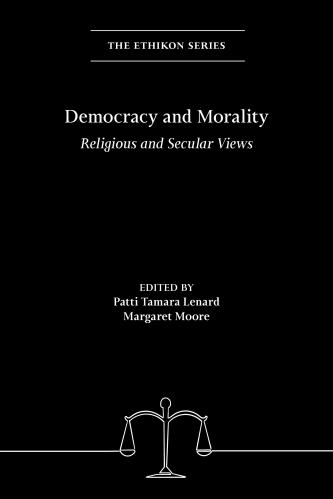
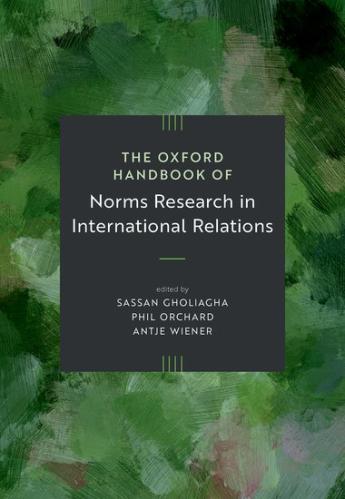
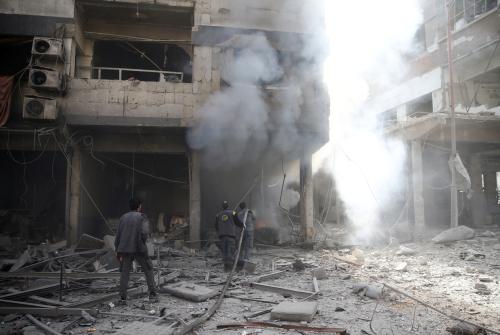
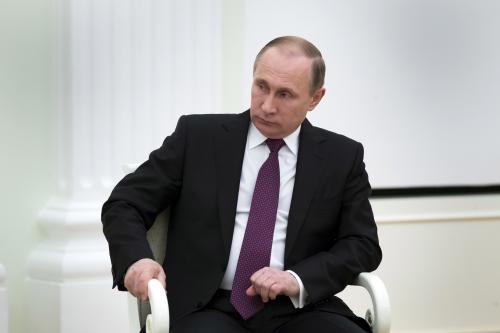
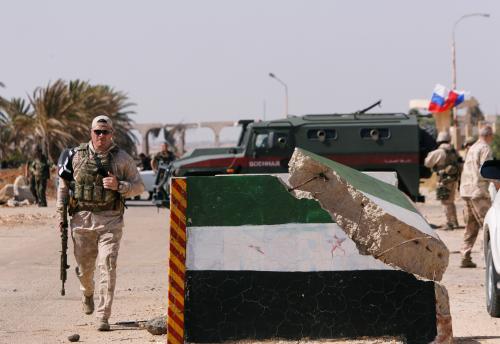
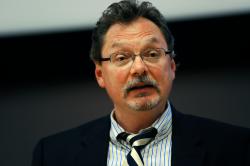



Commentary
Putin’s road from Damascus: After the “victory,” what?
January 8, 2018